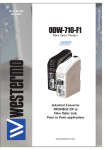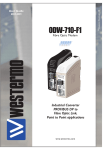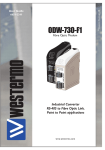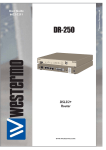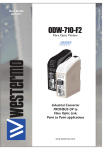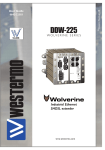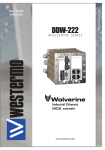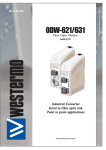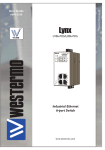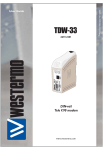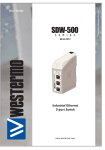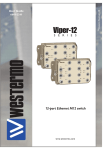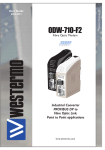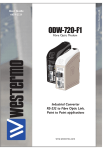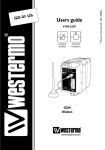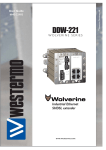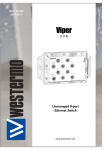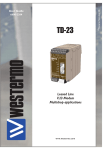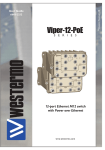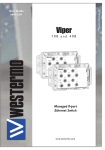Download ODW730-F2 - Manual
Transcript
6651-2251 ODW-730-F2 Fibre Optic Modem Industrial Converter RS-485 to Fibre Optic Link. Repeater, line and redundant ring www.westermo.com © Westermo Teleindustri AB User Guide Legal information The contents of this document are provided “as is”. Except as required by applicable law, no warranties of any kind, either express or implied, including, but not limited to, the implied warranties of merchantability and fitness for a particular purpose, are made in relation to the accuracy and reliability or contents of this document. Westermo reserves the right to revise this document or withdraw it at any time without prior notice. Under no circumstances shall Westermo be responsible for any loss of data or income or any special, incidental, and consequential or indirect damages howsoever caused. More information about Westermo can be found at the following Internet address: http://www.westermo.com 2 6651-2251 Safety ! ! ! Before installation: Read this manual completely and gather all information on the unit. Make sure that you understand it fully. Check that your application does not exceed the safe operating specifications for this unit. This unit should only be installed by qualified personnel. This unit should be built-in to an apparatus cabinet, or similar, where access is restricted to service personnel only. The power supply wiring must be sufficiently fused, and if necessary it must be possible to disconnect manually from the power supply. Ensure compliance to national installation regulations. This unit uses convection cooling. To avoid obstructing the airflow around the unit, follow the spacing recommendations (see Cooling section). Before mounting, using or removing this unit: Prevent access to hazardous voltages by disconnecting the unit from the power supply. Warning! Do not open a connected unit. Hazardous voltages may occur within this unit when connected to a power supply. Class 1 Laser Product This unit is designed to meet the Class 1 Laser regulations. However, the user is warned not to look directly into fibre optical port or any connected fibre. Care recommendations Follow the care recommendations below to maintain full operation of the unit and to fulfil the warranty obligations. This unit must not be operated with covers or lids removed. Do not attempt to disassemble the unit. There are no user serviceable parts inside. Do not drop, knock or shake the unit. Rough handling beyond the specification may cause damage to internal circuit boards. Do not use harsh chemicals, cleaning solvents or strong detergents to clean the unit. Do not paint the unit. Paint can clog the unit and prevent proper operation. Do not expose the unit to any kind of liquids (rain, beverages, etc). The unit is not waterproof. Keep the unit within the specified humidity levels. Do not use or store the unit in dusty, dirty areas. Connectors as well as other mechanical parts may be damaged. If the unit is not working properly, contact the place of purchase, nearest Westermo distributor office, or Westermo Tech support. Fibre connectors are supplied with plugs to avoid contamination inside the optical port. The plug should be fitted when no optical fibre is inserted in the connector, e.g. during storage, service or transportation. 6651-2251 3 Note. Fibre Optic Handling Fibre optic equipment requires careful handling as the fibre components are very sensitive to dust and dirt. If the fibre is disconnected from the modem, the protective plug on the transmitter/receiver must be replaced. The protective plug must be kept on during transportation. The fibre optic cable must also be protected in the same way. If this recommendation is not followed, it can jeopardise the warranty. Cleaning of the optical connectors In the event of contamination, the optical connectors should be cleaned by using forced nitrogen and some kind of cleaning stick. Recommended cleaning fluids: • Methyl-, ethyl-, isopropyl- or isobutyl-alcohol • Hexane • Naphtha Maintenance No maintenance is required, as long as the unit is used as intended within the specified conditions. Agency approvals and standards compliance Type Approval / Compliance EMC EN 61000-6-1, Immunity residential environments EN 61000-6-2, Immunity industrial environments EN 61000-6-3, Emission residential environments EN 61000-6-4, Emission industrial environments EN 55022, Emission IT equipment, class A EN 55024, Immunity IT equipment FCC part 15 Class A EN 50121-4, Railway signalling and telecommunications apparatus IEC 62236-4, Railway signalling and telecommunications apparatus Safety EN 60950-1, IT equipment ATEX* EN 60079-0 and EN 60079-15 * Applicable for ODW-730-F2 Ex only FCC Part 15.105 Notice: This equipment has been tested and found to comply with the limits for a Class A digital device, pursuant to Part 15 of the FCC Rules. These limits are designed to provide reasonable protection against harmful interference when the equipment is operated in a commercial environment. This equipment generates, uses, and can radiate radio frequency energy and, if not installed and used in accordance with the instruction manual, may cause harmful interference to radio communications. Operation of this equipment in a residential area is likely to cause harmful interference in which case the user will be required to correct the interference at his own expense. EN 55022 Notice: This is a class A product. In a domestic environment this product may cause radio interference in which case the user may be required to take adequate measures. 4 6651-2251 ATEX Information (Applicable for ODW-730-F2 Ex only) General This unit is intended for use in Zone 2 hazardous location only. Marking II 3 G Ex nA IIC T4 Gc SPECIAL CONDITION WARNING – DO NOT SEPARATE WHEN ENERGIZED Indicate that this unit complies with relevant European standards that are harmonised with the 94/9/EC Directive (ATEX). II 3 G Ex nA IIC T4 Gc SPECIAL CONDITION 6651-2251 Equipment group II. This unit can be installed in all places with an explosive gas atmosphere other than mines susceptible to firedamp Equipment category 3. A category is the classification according to the required level of protection. This unit ensures the requisite level of protection during normal operation and is intended for use in areas in which explosive atmosphere caused by gases, vapours, mists, or dust mixtures are unlikely to occure or, if they do occure, are likely to do so only infrequently and for a short periode only. Indicates protection concerning explosive atmospheres caused by gases, vapours or mists (G). Indicates that this unit is in conformity with relevant European Ex standard(s). Type of protection used. This unit is a non-sparking device "nA" which is constructed to minimize the risk of occurence of arcs or sparks capable of creating an ignition hazard during conditions of normal operation. Gas group, a typical gas i hydrogen. Temperature class T4 (T4 = 135°C). This unit is classified in accordance with its maximum surface temperature (external and internal). Equipment protection level Gc (EPL Gc). Equipment for explosive gas atmospheres, having a "enhanced" level of protection, which is not a source of ignition in normal operation and which may have some additional protection to ensure that it remains inactive as an ignition source in the case of regular expected occurences. EPL Gc are analogous to the ATEX Categories (Category 3 G = EPL Gc). This unit has a special condition of use. The special condition for safe use contains safety related information that is necesarry for the correct installation and safe use. 5 Ratings Power Ambient temperature Ingress protection (IP) Maximum surface temperatur (12 – 48) VDC; 400 mA –40ºC ≤ Ta ≤ +60ºC IP21 135ºC (temperature class T4) Safety Control Drawing Degree of protection Ambient temperature Installation spacing IP 21 –40°C to +60°C Minimum 25 mm above / below Minimum 10 mm left / right Direction relative this unit! Position 1 2 3 Descripton In & out / Relay contact (NO) In & out / Relay contact (C) In & out / Relay contact (NC) Input / Output values Uin = 60 VDC max Iin = 500 mA max Galvanically isolated via mechanical relay. See user manual for proven transient protection. Descripton In+ (EIA RS-485 A) In / R– (EIA RS-485 B) In/out / T+ (EIA RS-485 A) 4 In/out / T– (EIA RS-485 B) Input / Output values Umax = ± 5 Vpk Imax = ± 250 mA Data rate: 300 bit/s to 1.5 Mbit/s 123 4 Position 1 2 3 Position Descripton Rx In / Receive port Tx Out / Transmit port Position Descripton 1 In / Common 2 3 4 In / +Voltage A In / +Voltage B In / Common Output values Max 0 dBm Intput values Uin = (10 – 60) VDC Iin = 550 mA max PIn = Max 5.5 W See section Type tests and environmental conditions in this user manual for proven transient protection. 6 6651-2251 SPECIAL CONDITION FOR SAFE USE Ambient temperature: This unit is designed for use in extreme ambient temperature conditions as follows: –40 ºC ≤ Ta ≤ +60 ºC Installation in an apparatus cabinet: This unit requires installation in an Ex certified apparatus cabinet suitable for the area of use and providing a degree of protection of at least IP54. Resistance to impact: This unit requires installation in an apparatus cabinet where adequate resistance to impact is provided by the apparatus cabinet. See "Installation in an apparatus cabinet" above for requirements on the external apparatus cabinet. Resistance to light: This unit requires installation in an apparatus cabinet where it is protected from light (for example daylight or light from luminaires). See "Installation in an apparatus cabinet" above for requirements on the external apparatus cabinet. Secureness of plugs: When this unit is installed in an explosive atmospheres, all connectors must be mechanically secured to prevent loosening. Conductor temperature: When this unit is installed in locations with high ambient temperature, special precautions shall be taken upon the choice of external conductors and the temperature rating of the conductor(s). Directive 94/9/EC alongside with other directives: Directive 2004/108/EC (EMC) applies and to assure a safe performance of this unit under the scope of Directive 94/9/EC, refer to the electromagnetic immunity level specified under "Type tests and environmental conditions" in this manual. Standards and date of compliance EN 60079-0 and EN 60079-15 2010-12-17 6651-2251 7 Declaration of Conformity Westermo Teleindustri AB Declaration of conformity The manufacturer Westermo Teleindustri AB SE-640 40 Stora Sundby, Sweden Herewith declares that the product(s) Type of product Model Art no Industrial fiberoptic repeaters/media converters ODW-700 series 3651-07xx ODW-700EX series 3651-37xx is in conformity with the following EC directive(s). No Short name 2004/108/EC 94/9/EC1 Electromagnetic Compatibility (EMC) Equipment Explosive Atmospheres (ATEX) References of standards applied for this EC declaration of conformity. No EN 61000-6-1 Title Electromagnetic compatibility – Immunity residential environments Issue 2007 EN 61000-6-2 Electromagnetic compatibility – Immunity industrial environments 2005 EN 61000-6-3 Electromagnetic compatibility – Emission residential environments 2007 EN 61000-6-4 2007 EN 55022 Electromagnetic compatibility – Emission for industrial environments Information technology equipment - Emission EN 55024 Information technology equipment - Immunity EN 50121-4 Railway applications – Electromagnetic compatibility – Emission and immunity of the signalling and telecommunications apparatus Explosive atmospheres – Equipment – General requirements 1998 + A1:2001 + A2:2003 2006 EN 60079-0 EN 60079-15 Electrical apparatus for explosive gas atmospheres – Construction, test and marking of type of protection “n” electrical apparatus The last two digits of the year in which the CE marking was affixed: 2006 + A1:2007 2009 2005 11 Pierre Öberg Technical Manager 15th June 2011 1 8 Applicable for ODW-700EX series only. Postadress/Postal address Tel. Telefax Postgiro Bankgiro Org.nr/ Corp. identity number Registered office S-640 40 Stora Sundby Sweden 016-428000 Int+46 16428000 016-428001 Int+46 16428001 52 72 79-4 5671-5550 556361-2604 Eskilstuna 6651-2251 Type tests and environmental conditions Electromagnetic Compatibility Phenomena Test ESD EN 61000-4-2 RF field AM modulated IEC 61000-4-3 RF field 900 MHz Fast transient ENV 50204 EN 61000-4-4 Surge EN 61000-4-5 RF conducted EN 61000-4-6 Pulse Magnetic field Voltage dips and interruption EN 61000-4-9 EN 61000-4-11 Mains freq. 50 Hz Mains freq. 50 Hz Radiated emission EN 61000-4-16 SS 436 15 03 EN 55022 FCC part 15 EN 55022 FCC part 15 EN 55022 EN 60950 Conducted emission Dielectric strength Environmental Temperature Shock Packaging Enclosure, ODW-730-F2 Enclosure, ODW-730-F2 EX Dimension W x H x D Weight Degree of protection Cooling Mounting 6651-2251 Enclosure Signal ports Power ports Signal ports unbalanced Signal ports balanced Power ports Signal ports Power ports Enclosure AC power ports Signal ports Signal ports Enclosure AC power ports AC power ports DC power ports Signal port to all other isolated ports Power port to other isolated ports IEC 60068-2-6 Operating Storage & Transport Maximum surface temperature Operating Storage & Transport Operating Operating Operating IEC 60068-2-27 Operating UL 94 PC / ABS Cabelec 6141 Humidity Altitude Service life Vibration Description Enclosure contact Enclosure air Enclosure IEC 529 Enclosure Level ± 6 kV ± 8 kV 10 V/m 80% AM (1 kHz), 80 – 800 MHz 20 V/m 80% AM (1 kHz), 800 – 1000 MHz 20 V/m 80% AM (1 kHz), 1400 – 2700 MHz 20 V/m pulse modulated 200 Hz, 900 ± 5 MHz ± 2 kV ± 2 kV ± 2 kV line to earth, ± 2 kV line to line ± 2 kV line to earth, ± 1 kV line to line ± 2 kV line to earth, ± 2 kV line to line 10 V 80% AM (1 kHz), 0.15 – 80 MHz 10 V 80% AM (1 kHz), 0.15 – 80 MHz 300 A/m, 6.4 / 16 µs pulse 10 & 5 000 ms, interruption 200 ms, 40% residual voltage 500 ms, 70% residual voltage 100 V 50 Hz line to earth 250 V 50 Hz line to line Class B Class A Class B Class B Class A 2 kVrms 50 Hz 1min 3 kVrms 50 Hz 1min 2 kVrms 50 Hz 1min (@ rated power < 60V) –40 to +60°C –40 to +70°C 135ºC (temperature class T4) 5 to 95% relative humidity 5 to 95% relative humidity 2 000 m / 70 kPa 10 year 7.5 mm, 5 – 8 Hz 2 g, 8 – 500 Hz 15 g, 11 ms Flammability class V-1 35 x 121 x 119 mm 0.26 kg IP 21 Convection Horizontal on 35 mm DIN-rail 9 Functional description Switches LED’s POWER +VA +VB COM O V P Internal Electronics COM +5V 0V O V P STATUS NO C NC ODW-730 +5V RS -485 O C P T/R T/R+ RR+ 0V CH 1 OVP Over Voltage Protection OCP Over Current Protection SFP Fibre transceiver TX RX SFP Fibre transceiver TX RX CH 2 Converter serial interface – optical fibre ODW-730 is a fibre optic modem that converts between electrical RS-485 and a fibre optical link. ODW-730 can also be used to convert from RS-485 to RS-232 by using a ODW-730 in the same link as ODW-720. Repeater – optical fibre links ODW-730 is a fibre optic repeater that repeats received data from one fibre link out to the other link. This is useful e.g. for long distance communication, where electromagnetic interference may occur or when isolation of the electrical network is needed. The maximum optical fibre distance depends on selected fibre transceiver and fibre type. Distances up to 80 km (50 miles) are available. 10 6651-2251 Interface specifications Power Rated voltage Operating voltage Rated current Rated frequency Inrush current I²t Startup current* Polarity Redundant power input Isolation to Connection Connector size Shielded cable ODW-730-F2: 12 to 48 VDC and 24 VAC ODW-730-F2 Ex: 12 to 48 VDC ODW-730-F2: 10 to 60 VDC and 20 to 30 VAC ODW-730-F2 Ex: 10 to 60 VDC 400 mA @ 12 V 250 mA @ 24 V 100 mA @ 48 V ODW-730-F2: DC and 48 to 62 Hz ODW-730-F2 Ex: DC 0.2 A²s 1.0 Apeak Reverse polarity protected Yes RS-485 and Status port Detachable screw terminal 0.2 – 2.5 mm² (AWG 24 – 12) Not required * External supply current capability for proper startup Status Port type Rated voltage Operating voltage Contact rating Contact resistance Isolation to Connection Connector size Shielded cable 6651-2251 Signal relay, changeover contacts Up to 48 VDC Up to 60 VDC 500 mA @ 48 VDC < 50 mW RS-485 and Power port Detachable screw terminal 0.2 – 2.5 mm² (AWG 24 – 12) Not required 11 RS-422/485 Electrical specification Data rate Data format Protocol Retiming Turning time (2-wire RS-485) Transmission range Settings Protection Isolation to Connection Connector size Shielded cable EIA RS-485, 2-wire or 4-wire twisted pair 300 bit/s – 1.5 Mbit/s 9 – 12 bits Start-bit followed by 8-11 bits Yes One tbit tbit = 1 / Baud rate (Baud rate in bit/s) < 1200 m, depending on data rate and cable type (EIA RS-485) 120 W termination and failsafe biasing 680 W Installation Fault Tolerant (up to ±60 V) Status and Power port Detachable screw terminal 0.2 – 2.5 mm² (AWG 24 – 12) Not required Optical Power Budget The allowed link length is calculated from the optical power budget (OPB), the available optical power for a fibre-optic link, and the attenuation of the fibre, comprising losses due to in-line connectors, splices, optical switches and a margin for link ageing (typical 1.5 dB for 1300 nm). The worst-case optical power budget (OPB) in dB for a fibre-optic link is determined by the difference between the transmitter’s output optical power (min) and the receiver input sensitivity (max). FX (Fibre) Fibre connector Fibre type SM-LC80 LC duplex Singlemode 9/125 mm SM-LC40 LC duplex Singlemode 9/125 mm SM-LC15 LC duplex Singlemode 9/125 mm Wavelength Transmitter Output optical power min/max Receiver Input sensitivity, max Receiver Input optical power, max Optical power budget, worst-case Transceiver type 1550 nm –5/0 dBm** 1310 nm –5/0 dBm** 1310 nm –15/–8 dBm** MM-LC2 LC duplex Multimode, 62.5/125 and 50/125 mm 1310 nm –20/–14 dBm* –34 dBm –34 dBm –33 dBm –31 dBm 0 dBm*** 0 dBm*** 0 dBm –8 dBm 29 dB 29 dB 18 dB 11 dB Laser class * ** *** 12 Small Form Factor Pluggable (SFP) Multi-Sourcing Agreement (MSA) compliant Class 1, IEC 825-1 Accessible Emission Limit (AEL) Output power is power coupled into a 62.5/125 mm multimode fibre Output power is power coupled into a 9/125 mm singlemode fibre The optical power should be reduced by at least 5 dB (SM-LC80 and Bi-di LC-60) or 3dB (SM-LC-40 and Bi-di LC-40) between the optical output and input. 6651-2251 FX (Fibre) Fibre connector Fibre type Wavelength nm, connector 1 Wavelength nm, connector 2 Transmitter Output optical power min/max Receiver Input sensitivity, max Receiver Input optical power, max Optical power budget, worst-case Bit error rate (BER) Transceiver type Laser class * ** *** Bi-di LC-40 LC Simplex Singlemode 9/125 μm Bi-di LC-20 LC Simplex Singlemode 9/125 μm Tx 1310, rx 1550 Tx 1550, rx 1310 –8/0 dBm** Tx1310, rx 1550 TX 1550, rx 1310 –14/8 dBm** Bi-di MM LC-2 LC Simplex Multimode 62.5/125 and 50/125 μm Tx 1310, rx 1550 Tx 1550, rx 1310 –10/–0 dBm* –32 dBm –31 dBm –27 dBm –3 dBm*** 0 dBm 0 dBm 24 dB 17 dB 17 dB < 1 x 10-10 < 1 x 10-10 < 1 x 10-10 Output power is power coupled into a 62.5/125 mm multimode fibre Output power is power coupled into a 9/125 mm singlemode fibre The optical power should be reduced by at least 5 dB (SM-LC80 and Bi-di LC-60) or 3dB (SM-LC-40 and Bi-di LC-40) between the optical output and input. 6651-2251 13 Location of Interface ports, LED’s and DIP-switches ODW-730-F2 LED Indicators(for details see page 15) DIP-switches accessible under lid (for details see page 16–18) Status screw terminal Position 1 2 3 Description Contact with C when fibre optical links are in operation Common Open (no contact with C) when fibre optical links are not in operation Product marking NO C NC RS-422/485 screw terminal FX(Fibre) (for details see page 12–13) Position Direction* Description Product marking 1 In R+ (EIA RS-485 A’) 2 In R– (EIA RS-485 B’) R– 3 In/Out T+ (EIA RS-485 A) T/R+ 4 In/Out T– (EIA RS-485 B) T/R– R+ Power screw terminal Position Direction* 1 2 3 4 In In In In Description Common voltage Voltage A Voltage B Common voltage Product marking COM +VA +VB COM * Direction relative this unit 14 6651-2251 LED indicators LED Status Description PWR ON Power is on. OFF Power is off. ON Focal point OFF Redundant ring member or multidrop unit. ON Fiber link to other unit has been established at CH 2. Flashing Optical power detected but link to other unit has not been established at CH 2. OFF No optical power detected and no link to other unit has been established at CH 2. ON Fiber link to other unit has been established at CH 1. Flashing Optical power detected but link to other unit has not been established at CH 1. OFF No optical power detected and no link to other unit has been established at CH 1. Flash Data received on the electrical interface and transmitted out on the optical interface. OFF No data received on the electrical interface. Flash Data received on the optical interface and transmitted out on the electrical interface. OFF No data received on the optical interface. ON Remote fibre link failure. A fibre link is out of operation at any other unit than this one. Flashing Hardware error or invalid configuration. ON Local fibre link failure. A fibre link is out of operation at this unit. Flashing Hardware error or invalid configuration. Power FP CH 2 Channel 2 link status CH 1 Channel 1 link status TD RD FL R Failure link remote FL L Failure link local Note: During power up, all LED’s will turn on for about 1 second. 6651-2251 15 ! DIP-switch settings Before DIP-switch settings: Prevent damage to internal electronics from electrostatic discharges (ESD) by discharging your body to a grounding point (e.g. use of wrist strap) Note: Disconnect power before DIP-switch settings. S1 S2 S3 S1 DIP-switch, asynchronous mode speed selection ON ON 1 2 34 56 78 300 bit/s ON 1 2 34 56 78 ON 57.6 kbit/s ON 1 2 34 56 78 1200 bit/s 115.2 kbit/s ON 1 2 34 56 78 2400 bit/s 125 kbit/s ON 1 2 34 56 78 4800 bit/s 187.5 kbit/s ON 9600 bit/s 230.4 kbit/s ON 19.2 kbit/s 1 2 34 56 78 ON 1 2 34 56 78 ON 1 2 34 56 78 ON 1 2 34 56 78 ON 1 2 34 56 78 1 2 34 56 78 ON 1 2 34 56 78 ON 1 2 34 56 78 1 2 34 56 78 ON 1 2 34 56 78 ON 1.0 Mbit/s ON 1 2 34 56 78 ON 1 2 34 56 78 250 kbit/s 1 2 34 56 78 1.5 Mbit/s 9 bits data format 10 bits data format 11 bits data format 12 bits data format ON 1 2 34 56 78 38.4 kbit/s 1 2 34 56 78 500 kbit/s Supervision table when selecting data format Start bit … … … 7 bit … … … 8 bit … 16 10 … … … … … … … … … … 10 10 … 9 … … … 2 stop bit Number of bit … … Parity 1 stop bit … … … … 11 11 … 11 12 6651-2251 S1 DIP-switch, synchronous mode time frame selection ON ON 1 2 34 56 78 1.6 ms 1 2 34 56 78 ON ON 13 μs 1 2 34 56 78 ON 1 2 34 56 78 416 μs 1 2 34 56 78 ON ON 8.6 μs 1 2 34 56 78 ON 1 2 34 56 78 208 μs 1 2 34 56 78 ON 104 μs 1 2 34 56 78 ON 1 μs ON 4.3 μs 1 2 34 56 78 ON 1 2 34 56 78 2 μs 500 ns ON 4 μs 1 2 34 56 78 300 ns ON 1 2 34 56 78 52 μs 1 2 34 56 78 ON 2.6 μs ON 1 2 34 56 78 26 μs 1 2 34 56 78 2.1 μs S1 DIP-switch / Description V/Y mode ON ON V-mode Y-mode 1 2 34 56 78 1 2 34 56 78 If only fibre channel 1 is used or if redundant ring focal point OR OR channel 2 channel 1 OR channel 2 channel 1 RS-485 RS-485 If both fibre channels 1 and 2 are used and not redundant ring focal point OR channel 2 channel 1 RS-485 If only fibre channel 2 is used channel 2 channel 1 RS-485 For applications that only require half duplex communication it is recommended to use Y-mode. Please see the ODW-730 Management Guide for further details. 6651-2251 17 S2 DIP-switch ON 1 2 34 56 78 ON 1 2 34 56 78 ON RS-232 2-wire 1 2 34 56 78 RS-485 4-wire 1 2 34 56 78 Use secondary data channel. ON ON ON Multidrop mode. 1 2 34 56 78 1 2 34 56 78 ON ON Redundant ring mode. 1 2 34 56 78 ON 1 2 34 56 78 ON 1 2 34 56 78 1 2 34 56 78 Multidrop mid unit or Redundant ring member. Multidrop end unit. Redundant ring focal point. ON 1 2 34 56 78 Single channel system redundant ring. E.g. only the primary or secondary channel is used. Dual channel system redundant ring. E.g. both the primary and secondary channel are used simultaneously. Set status port on both local fibre link (FL L) and remote fibre link (FL R) errors. Set status port on local fibre link (FL L) error only. ON S2:7 has no function 1 2 34 56 78 ON ON Use primary data channel. 1 2 34 56 78 Always OFF 1 2 34 56 78 S3 DIP-switch ON ON No termination and fail-safe 1 2 34 Termination with fail-safe (2-wire) 1 2 34 ON Termination with fail-safe (4-wire) 1 2 34 Factory default ON 1 2 34 56 78 18 ON S1 1 2 34 56 78 S2 6651-2251 RS-485 termination at system level The system should be installed in according to the RS-485 specification. A system should always form a bus structure where the termination is at the end points of the bus. See diagrams for details of how this is done with RS-485 2-wire and 4-wire. R+ R– T+ T– ODW-730 Series R– R+ T– T+ R– R+ T– T+ R– R+ T– T+ =Termination Slave unit Slave unit Slave unit T/R+ T/R– Max 0.3 metre ODW-730 Series T/R– T/R+ T/R– T/R+ T/R– T/R+ =Termination Slave unit 6651-2251 Slave unit Slave unit 19 About the interfaces Power terminal The power terminal has two independent inputs, +VA and +VB, allowing redundancy should either fail. The ODW-730 power supply is galvanically isolated from all other internal electronics. Optical fibre interfaces ODW-730 uses Small From Factor Pluggable (SFP) transceivers that are in compliance with the Multi-Sourcing Agreement (MSA). This means that a wide range of different fibre tranceivers and connectors can be used. RS-485 interface A 4 position detachable screw terminal that can handle full duplex data rates up to 1.5 Mbit/s and can be set to either 2- or 4-wire RS-485 system. When 4-wire RS-485 is selected, the terminals T/R+ and T/R– will always be set to transmit and terminals R+ and R– will always receive data. Manchester coded protocol can be tranferred with Synchroous mode. Status port The status port connects to an internal relay wich may be used to trigger an external alarm if a fault condition occurs. During normal operation pins 1 and 2 are in contact with each other, and pins 2 and 3 are isolated. During an optical link failure, or power failure, pins 1 and 2 are isolated, and pins 2 and 3 are in contact with each other. Optical link failures can be classified in to two categories, local or remote, as indicated by the FL L and FL R LED’s. A local link failure is when an optical link is down at this particular unit. A remote link failure is when an optical link is down at some other unit. From the factory, the status port is set to trigger on both types of link failures. However, by setting DIP-switch S2:6 to the ON position, the status port will only trigger when a local link failure has occured. 20 6651-2251 Mounting This unit should be mounted on 35 mm DIN-rail, which is horizontally mounted inside an apparatus cabinet, or similar. Snap on mounting, see figure. CLICK! CLICK! Cooling This unit uses convection cooling. To avoid obstructing the airflow around the unit, use the following spacing rules. Minimum spacing 25 mm (1.0 inch) above /below and 10 mm (0.4 inches) left /right the unit. Spacing is recommended for the use of unit in full operating temperature range and service life. 10 mm * (0.4 inches) * S pacing (left/right) recommended for full operating temperature range 25 mm 25 mm Removal Press down the black support at the top of the unit. See figure. 6651-2251 21 Referring documents For detailed information on how to configure the ODW-730-F2 for different applications. Type Management Guide 22 Description Management Guide ODW-730-F2 Document number 6651-2255 6651-2251 Westermo Teleindustri AB • SE-640 40 Stora Sundby, Sweden Phone +46 16 42 80 00 Fax +46 16 42 80 01 E-mail: [email protected] Westermo Web site: www.westermo.com United Kingdom Westermo Data Communications Ltd Talisman Business Centre • Duncan Road Park Gate, Southampton • SO31 7GA Phone: +44(0)1489 580‑585 • Fax.:+44(0)1489 580586 E-Mail: [email protected] Germany Westermo Data Communications GmbH Goethestraße 67, 68753 Waghäusel Tel.: +49(0)7254-95400-0 • Fax.:+49(0)7254-95400-9 E-Mail: [email protected] France Westermo Data Communications S.A.R.L. 9 Chemin de Chilly 91160 CHAMPLAN Tél : +33 1 69 10 21 00 • Fax : +33 1 69 10 21 01 E-mail : [email protected] Singapore Westermo Data Communications Pte Ltd 2 Soon Wing Road #08-05 Soon Wing Industrial Building Singapore 347893 Phone +65 6743 9801 • Fax +65 6745 0670 E-Mail: [email protected] North America Westermo Data Communications 939 N. Plum Grove Road, Suite F Schaumburg Chicago Phone: +1 847 619 6068 Fax: +1 847 619 66 74 E-mail: [email protected] Taiwan Westermo Data Communications Co F2, No. 188, Pao-Chiao Rd. Shing-Tien City Taipei 23145 Phone:+886 2 8911 1710 E-mail: [email protected] Westermo Teleindustri AB have distributors in several countries, contact us for further information. REV.A 6651-2251 2011-04 Westermo Teleindustri AB, Sweden – A Beijer Electronics Group Company Sales Units Sweden Westermo Data Communications AB Svalgången 1 SE-724 81 Västerås Phone: +46 (0)21 548 08 00 • Fax: +46 (0)21 35 18 50 E-Mail: [email protected]

























